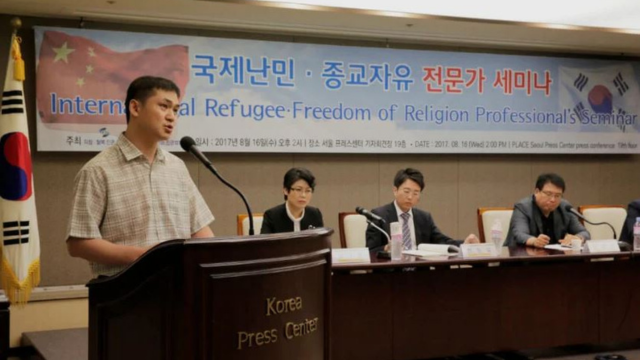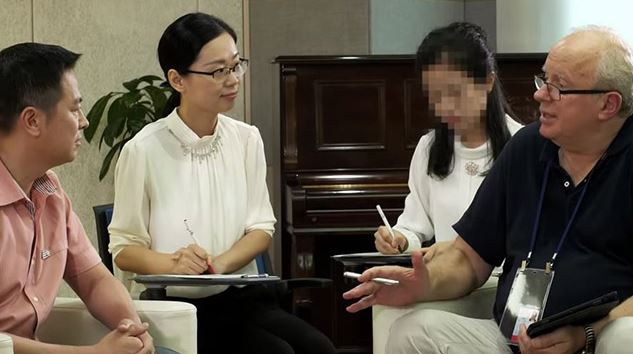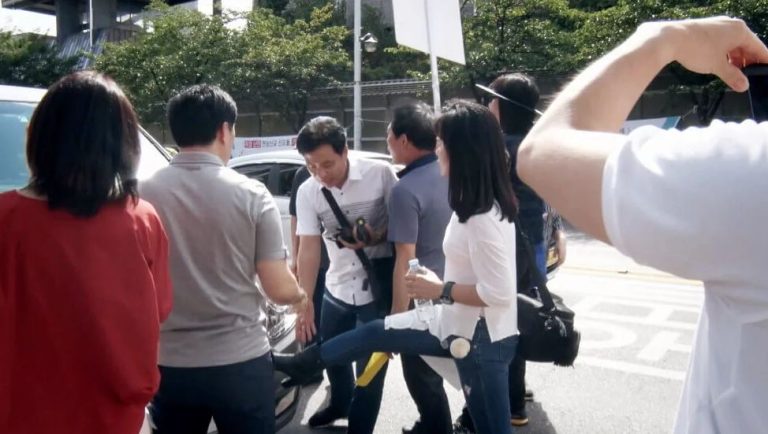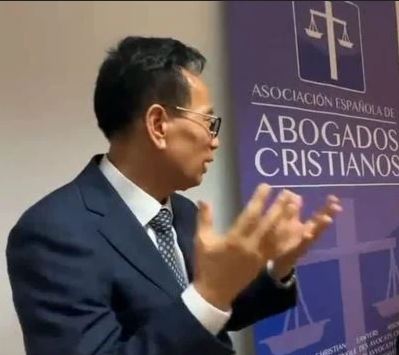Kidnapping refugees is an extreme step, but the CCP effectively harasses them through digital suppression and the mobilization of anti-cultists.
Article 4 of 5. Read article 1, article 2, and article 3.

[Tentacle 4] Abductions
Fleeing religious persecution, CAG member Zhang Fu sought asylum in South Korea. In early 2016, his wife visited him there and understood his inability to return home due to persecution. On May 18, 2016, his wife and sister suddenly requested a meeting with him on Jeju Island through South Korea’s Ministry of Justice. After the meeting on May 22, they repeatedly urged him to go back to China, with his wife saying, “You must go back, even if it means going to prison!”
On the morning of May 23, after receiving a WeChat message, Zhang’s sister insisted on moving from their hotel to the second floor of the Maple Hotel. That afternoon, Zhang returned to his room and found a stranger hiding in the bathroom—later identified as “Xiao Han”—who stayed until discovered. Zhang’s wife and sister claimed they knew Xiao Han. After Xiao Han left, Zhang found his passport missing and his phone tampered with. His wife arranged a call with a Chinese police instructor surnamed Cheng, who repeatedly assured Zhang that returning to China was safe, stating, “I’ve handled over 2,000 cases like yours…” Xiao Han also encouraged Zhang to talk more with Cheng, admitting Cheng was his “teacher.”
That evening, after drinking juice offered by his sister, Zhang fell unconscious until morning. When he woke, he found his phones gone and learned Xiao Han was staying upstairs. Sensing danger, Zhang fled the hotel. To recover his passport, he met his sister at Jeju International Airport, where Xiao Han, his sister, and his wife surrounded him, attempting to force him back to China. Zhang escaped into the crowd as Xiao Han shouted, “Stop! Zhang Fu, stop!”—a tactic often used by Chinese police during arrests.

Despite the danger, Zhang ran until he reached safety. Later, Xiao Han used Zhang’s phone to contact other CAG members, threatening to disclose information about dozens of CAG members to the CCP authorities if he would not be allowed to meet Zhang.
Zhang stated that his wife and sister, lacking sophistication, could not independently coordinate with South Korea’s Ministry of Justice, move to Xiao Han’s location, confiscate his passport, or arrange for Chinese police persuasion. This was a planned, organized transnational abduction attempt by Chinese public security.
[Tentacle 5] Cyber Attacks and Digital Repression
In 2018, a CCP document detailed plans to boost infiltration and oversight of key overseas CAG websites. Another document, the same year, mandated strict monitoring of online public opinion, especially to identify, block, and remove content from religious groups considered “detrimental to the government.” From 2018 to 2024, the CAG’s official website experienced multiple cyberattacks, leading to temporary outages. Supporters such as international human rights groups, scholars, experts, and journalists also faced cyber threats. In September 2018, the Forum for Religious Freedom Europe (FOREF) reported on the CCP’s fake “family reunification” events in South Korea, where fourteen related videos garnered significant views and downloads.
Days later, “Bitter Winter” reported that pro-CCP (or CCP-directed) hackers attacked FOREF’s YouTube channel, maliciously deleting eight videos, including one about the fake protests and seven interviews with CAG members in South Korea.

In September 2023, the U.S. Department of State’s Global Engagement Center (GEC) published a report revealing that the Chinese government allocates billions yearly to overseas information operations to promote its policies and silence dissent. The report highlighted the crucial role of digital technologies and cyber tools in enabling the CCP’s information manipulation and suppression efforts.
[Tentacle 6] Establishing Anti-Cult Organizations Overseas to Attack the CAG
In February 2016, an internal CCP document titled “Outline for Conveying the Spirit of Central Leadership Speeches and Relevant Meetings of the Central Anti-Xie-Jiao Office” cited then-Politburo Standing Committee member Meng Jianzhu. He explicitly instructed to “integrate various ‘anti-cult’ platforms, explore support or establishment of online platforms overseas, and conduct public opinion guidance and countermeasures” to suppress the CAG entirely. As it happened with other persecuted groups, overseas so-called “anti-cult” organizations and websites targeting the CAG have become part of the CCP’s global repression efforts. These groups, claiming independence and public welfare, work closely with the CCP’s official propaganda narrative.
(6.1) “Religions & Truth” and Its Organizer O Myung-Ok
“Religions & Truth”, a Chinese-language “anti-cult research” platform registered in South Korea and claiming independence, is led by O Myung-Ok, an active member of South Korea’s anti-cult network. O Myung-Ok has launched several attacks against The Church of Almighty God and other groups through her platform and organized false “family reunification” protests. Her website also publicly released passport photos and residential information of CAG members in South Korea, sparking considerable controversy.
The “Bitter Winter” documentary “The Long Arm of the Dragon” documented that in 2016, “Religions & Truth” published passport details and personal information of over seventy CAG members in South Korea. These data were only accessible to the CCP government. How O Myung-Ok acquired this information remains unclear. As mentioned earlier in this series, on June 14, 2024, a Rome court ruled that she was a Chinese “agent.”

(6.2) Jin Yong-Sik: A Driver of Transnational Pressure and “Anti-Cult” Propaganda
Jin Yong-Sik, the President of the South Korean Christian Heresy Counseling Center Association and a deprogrammer, has historically engaged in defamation and slander against the CAG under the pretext of “anti-cult” activities.
In 2024, he traveled to Spain to conduct a seminar and deliver a statement urging the Spanish government to deport CAG members.

Later, Chinese websites like “Da Ai Wang,” “Awakener Alliance,” and “China Anti-Xie-Jiao Network” showed unified support, stating that Jin Yong-Sik convinced a Spanish lawyer to cease helping CAG members with asylum requests. Jin Yong-Sik also campaigned actively in Germany, Mongolia, and other nations to ask these countries to deport CAG members, denounce various groups as “cults,” and justify their repression in China.
Furthermore, Jin Yong-Sik frequently arranges anti-CAG initiatives across South Korea.
Source: Bitter Winter












